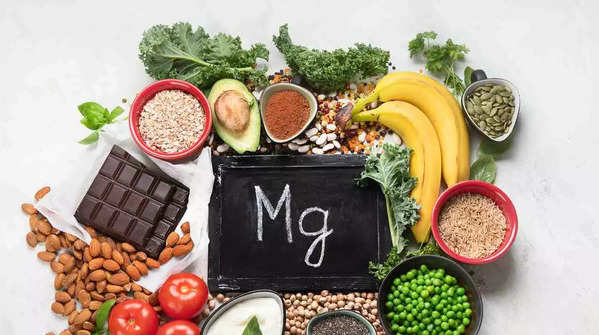AA
Text Size
- Small
- Medium
- Large

1/8
Why is Magnesium important for women?
Magnesium is the fourth most abundant mineral in the human body and plays an essential role in the body’s general health. It supports the immune system, regulates blood sugar levels, and contributes to bone health. For women, magnesium is important as it can also help in relieving symptoms with premenstrual syndrome (PMS), pelvic pain, and menopause. Studies also reveal that pregnant women with enough magnesium show less complications and improved maternal health as compared to women who don’t. Magnesium also assists in the control of headache, anxiety, and even sleep disturbances. Research indicates that magnesium supplement may significantly improve PMS symptoms. A combination of magnesium and vitamin B6 may offer even greater benefits for PMS management. This is why women should be careful about the warning signs of magnesium deficiency.

2/8
Loss of Appetite
One of the initial signs of magnesium deficiency is a noticeable decrease in appetite. This can occur because magnesium plays a role in regulating neurotransmitters. When levels are low, these signals may become disrupted, leading to reduced food intake. If you find yourself consistently less interested in food or struggling to eat regular meals, it could be a sign that your body needs more magnesium.

3/8
Nausea
Nausea is another common symptom associated with low magnesium levels. This feeling can stem from the mineral’s role in digestive health; inadequate magnesium may disrupt normal gastrointestinal function, leading to discomfort and nausea. In some cases, this can escalate to vomiting if the deficiency continues. If you experience frequent nausea without an apparent cause, it might be worth considering your magnesium intake.

4/8
Menstrual cramps
Menstrual cramps are very common in women with low magnesium levels. The mineral relaxes muscles, and therefore, a lack of magnesium may cause increased muscle tension during menstruation. This tension can cause more severe cramps and pain during your period. If you often experience painful menstrual cramps, increasing your magnesium intake might help alleviate some of this pain.

5/8
Fatigue and Weakness
Fatigue and muscle weakness are prevalent symptoms of low magnesium. Magnesium is essential for energy production and without sufficient levels, your body struggles to convert food into usable energy. This can leave you feeling tired and weak throughout the day. If you find yourself unusually fatigued despite adequate rest and nutrition, you may want to consider evaluating your magnesium intake.

6/8
Vomiting
Alongside nausea, vomiting can also indicate magnesium deficiency. As the body’s magnesium levels drop, it may react by inducing vomiting as a protective mechanism against perceived toxins or imbalances. Persistent vomiting can lead to further complications such as dehydration and electrolyte imbalances. If you notice this symptom occurring frequently, it’s advisable to consult with a healthcare professional.

7/8
What are more severe signs as magnesium deficiency worsens?
As the magnesium deficiency worsens, the symptoms may become more severe. These include numbness or tingling in the limbs, seizures, personality changes such as anxiety or depression, irregular heart rhythms, and even coronary spasms.

8/8
How can you improve your magnesium intake?
To ensure that you have adequate magnesium levels, you need to include a wide variety of magnesium-rich foods in your diet. Leafy green vegetables, especially spinach, are good sources of this essential mineral. Legumes, such as beans and peas, are also high in magnesium. Nuts, particularly Brazil nuts and almonds and seeds like hemp, pumpkin, and linseeds, are also great sources. Whole grains, including brown rice and quinoa, increase your daily magnesium intake. By including these foods in your meals, you can effectively prevent magnesium deficiency and promote overall health.
FOLLOW US ON SOCIAL MEDIA
Visual Stories
Bigg Boss
Photostories
I’m Manas Ranjan Sahoo: Founder of “Webtirety Software”. I’m a Full-time Software Professional and an aspiring entrepreneur, dedicated to growing this platform as large as possible. I love to Write Blogs on Software, Mobile applications, Web Technology, eCommerce, SEO, and about My experience with Life.



